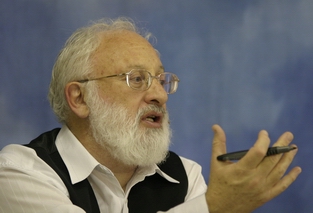
With the world in crisis, parents everywhere fear for their children’s future. Yet, if we rise to the challenge, we can set them on the path to a future far brighter than any we ever dreamed of.
As I sit at my computer, the neighborhood rings with the laughter of children playing tag. It brings back memories of my childhood, and I can’t help but wonder what the future has in store for them.
Mankind has always invested superhuman efforts to assure that the next generation will have an easier, more fulfilling life. For many parents today, this dream may forever remain a fantasy. Economic uncertainty, environmental collapse, and violence promise to be the legacy we will leave our children. A Rasmussen Poll in January found that only 47% of American parents believe their children will be better off than they are.
This gloomy outlook should be a clarion call to action for people everywhere. But if we are to have any hope of finding lasting solutions, we must first retrace the developments that led to the problems we face today.
Did Someone Press “Fast Forward?”
Mankind’s needs were simple once: If there was adequate food, shelter and security from predators, life was good. But time marched on, and the necessities were no longer enough. People wanted more from life, and so the relentless quest for new pleasures began. By the time we reached the 20th century, everything had accelerated, as if someone pressed “fast forward.” We went from horses to trains to jets; from telegraphs to phones to the Internet. With each generation, the luxuries of the parents became the necessities of the children.
This continuous escalation of selfindulgence has finally caught up with us, bringing our world to the brink of collapse. Our culture of excess reached its culmination with ego-maniacs like Bernard Madoff, who swindled investors of $50 billion. And while it’s easy to put the blame on the likes of Madoff, the reality is that we all bear a share of the guilt, even if our excesses are on a much smaller scale.
If we are honest, we’ll see that success in our society is defined as more money, fame or power, no matter what the cost to others. So what can we expect for our future if these are the values that we promote?
If egoism is the root of our problems, then the solution is to transform our values to altruism and sharing. But how? After all, mankind has prospered with a “Me first!” mentality for thousands of years. Yet, in today’s globalized society, where everything that happens on one side of the world has an almost immediate impact on the other side, “Me first!” no longer works. In the words of Britain’s PM, Gordon Brown, “In this global age, we need solutions that can no longer be defined in terms of us and them, but can be achieved only together – as us with them.”
New Problems Call for New Solutions
We can’t buy our way out of the current crisis with taxpayer dollars or consume our way out through increased shopping. We have to approach life from a new perspective, taking advantage of three powerful tools.
• Education
People today are lost and confused, wondering: Why is this happening? What should we do? But we are resourceful, and if we understand the problem, we will perform miracles to solve it. This is why a public education campaign about the globalization of our economies, the interdependence of all people, and the benefits of cooperation could guide us to the solutions.
Our best hope for the future lies in educating our children. NY Times columnist Nicholas Kristof recently classified education as “our greatest national shame.” And he’s right: we are not providing our children with the knowledge they need to succeed in the new global era. If we offer them an education about the natural laws that govern interconnected systems, they will be prepared to easily navigate the stormy seas that are so baffling to us.
• Media
Most of our behavioral patterns come directly from TV and the Internet. As long as news, entertainment and sports glorify the pursuit of wealth and a “win at any cost” mentality, we will see greed and exploitation dominate our society. If, however, we insist that these venues reflect the values of compassion, we will turn today’s destructive media force to our advantage.
And in fact, the tide is already starting to shift. A recent series of ads bears titles such as, “In an Absolut World, Currency will be Replaced with Acts of Kindness.” CNN’s series on economic survival features stories about people who find happiness through the renewal of family connections, sharing with others, and a simpler lifestyle. We just need to give things a push!
• The Power of Society
The most powerful instrument for change, however, is us. Throughout history, social change has been driven by the people. The 14th century Renaissance is just one example of a cultural movement that led to exponential advances in all areas. And today, the desire for change among the American people was so strong that it swept an unlikely candidate into the highest office.
This is the force we can harness to make the changes in today’s society. But how can we transform our approach to life from egoism to altruism when all we know is “taking care of #1”? Actually, our children can show us the way! When a child decides to become a doctor, he “plays” doctor, even though he has no idea what he is doing. Only when the child becomes a doctor will he know what it really means, but each of his imagined notions along the way is a necessary preparation.
So to begin with, we can “fake it until we make it.” Our first “altruistic” efforts will be purely egoistic: done to escape the crisis. Over time, however, an amazing transformation will occur: our simulated joy in altruism will give way to the real thing, providing real relief from the crisis.
Arne Duncan, the new Education Secretary, commented, “We have to continue to think differently and do everything we can to put our students … on the path to pursuing the American dream.” Let’s pressure our government to use part of the $150 billion education stimulus to create a new American dream, one that values activities that benefit all and frowns upon personal success at the expense of others. Let’s use the power of our collective will to show politicians and businesses that we are no longer buying into a consumer oriented society. Let’s encourage media to promote values of generosity and sharing, while shunning egoistic glorification of individuals. In this way, we will leave a lasting legacy to our children, and they will have the wisdom to know how to use it.
Related Material:






